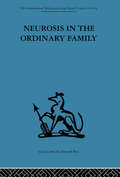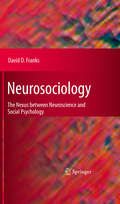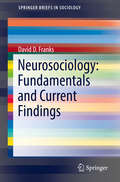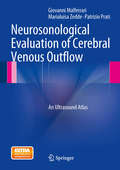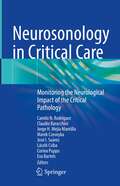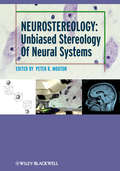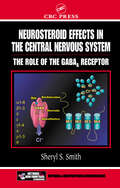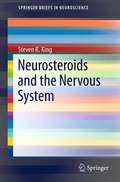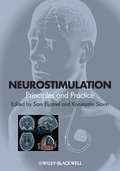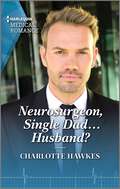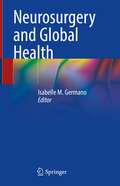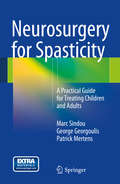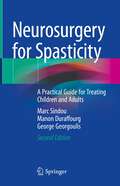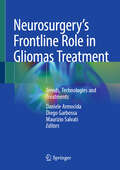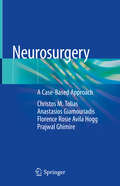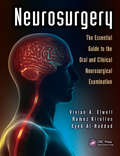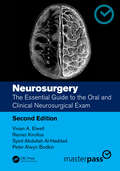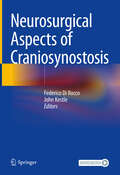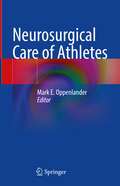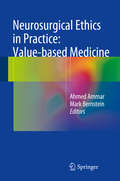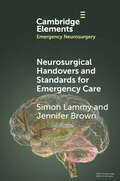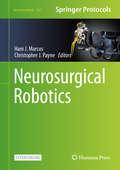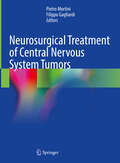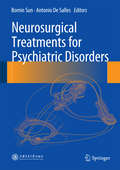- Table View
- List View
Neurosis in the Ordinary Family: A psychiatric survey
by Anthony RyleTavistock Press was established as a co-operative venture between the Tavistock Institute and Routledge & Kegan Paul (RKP) in the 1950s to produce a series of major contributions across the social sciences. This volume is part of a 2001 reissue of a selection of those important works which have since gone out of print, or are difficult to locate. Published by Routledge, 112 volumes in total are being brought together under the name The International Behavioural and Social Sciences Library: Classics from the Tavistock Press. Reproduced here in facsimile, this volume was originally published in 1967 and is available individually. The collection is also available in a number of themed mini-sets of between 5 and 13 volumes, or as a complete collection.
Neurosociology
by David D. FranksThe goal of this ground-breaking volume is to present how neuroscience research is relevant to sociologists and social psychologists as well as examining those areas of neuroscience that can refine and broaden sociological theory. The study of the brain and its effect on behavior grew to prominence in the mid-20th century. Neuroscientists and psychologists worked together in this area in the behavioral sciences but neuroscience has not had a big impact in sociology and the social sciences. Recently, neuroscientists have presented new research which has a direct impact on many areas of sociology. These include the human "self", the social nature of mind, socialization and language acquisition, role-taking and role-making, consciousness, intersubjectivity, a balanced social constructionism, human agency and the necessity of emotion for rational decision making. These are only some of the areas of sociology which and to which they have contributed important refinements.
Neurosociology: Fundamentals and Current Findings (SpringerBriefs in Sociology)
by David D. FranksThis book offers an introduction to the fundamentals of neurosociology and presents the newest issues and findings in the field. It describes the evolution of the brain and its social nature. It examines the concept of knowing and what can be known, as well as the subjective sensations we experience. Next, it explores the ubiquitousness of New Unconsciousness and the latest conclusions about mirror neurons. Additional themes and concepts described are sex differences in the brain, imitation, determinism and agency.The book brings together neuroscience and sociology, two fields that are very different in terms of method, theory, tradition and practice. It does so building on the following premise: If our brains have been forged evolutionarily over the many centuries for social life, sociologists should have the opportunity, if not the duty, to know about it whatever the reservations of some who think that any approach that includes biology must be reductionistic.
Neurosonological Evaluation of Cerebral Venous Outflow
by Giovanni Malferrari Marialuisa Zedde Patrizio PratiAlthough, within neurosonology, study of both the extracranial and the intracranial circulation began at least 15 years ago, it is only in recent years that ultrasound evaluation of cerebral veins and cerebral venous hemodynamics has attracted wider attention. Nevertheless, the huge variability in venous outflow pathways in normal subjects means that the potential usefulness of this examination is still often neglected. This atlas provides concise descriptions of the main normal and pathological ultrasound features of the cerebral venous circulation for neurosonologists and clinicians. It is designed as a practical tool that will be of assistance in everyday practice in the ultrasound lab and will improve the knowledge of sonologists and the reliability of venous ultrasound studies. The multimedia format, with detailed images, explanatory videos, and short, targeted descriptions, ensures that information is clearly conveyed and that users will become fully acquainted with the variability of normal findings of venous examinations. The atlas will be of value both to trainees in this field of ultrasound and to neurosonologists who are beginning to perform venous examinations in addition to arterial extra- and intracranial examinations.
Neurosonology in Critical Care: Monitoring the Neurological Impact of the Critical Pathology
by László Csiba Claudio Baracchini Marek Czosnyka José I. Suárez Camilo N. Rodríguez Jorge H. Mejía Mantilla Corina Puppo Eva BartelsThis textbook addresses the classical use of Transcranial Doppler (TCD) and Transcranial Color-Coded Duplex Sonography (TCCS), focusing on the usefulness of neurological monitoring beyond classical acute brain injuries present in the daily intensive care medical practice. It encompasses a wide range of critical pathologies where neurological impact is part of clinical evolution, offering practical approaches for managing, application and interpretation of neurosonology to assist the physician to making real-time individualized decisions at bedside.It is an academic guide developed and edited by international experts being a very useful resource in daily practice for intensivists, neurologists, neurosurgeons and other specialists involving in critical care.
Neurostereology: Unbiased Stereology of Neural Systems
by P. R. MoutonStereological methods provide researchers with unparalleled quantitative data from tissue samples and allow for well-evidenced research advances in a broad range of scientific fields. Presenting a concise introduction to the methodology and application of stereological research in neuroscience, Neurostereology provides a fuller understanding of the use of these methods in research and a means for replicating successful scientific approaches. Providing sound footing for future research, Neurostereology is a useful tool for basic and clinical researchers and advanced students looking to integrate these methods into their research.
Neurosteroid Effects in the Central Nervous System: The Role of the GABA-A Receptor (Frontiers in Neuroscience)
by Sheryl S. SmithPresenting a complete overview of the effects of steroid hormones in the brain and describing new methods for investigating these effects, this book discusses theories on steroid action in the central nervous system and the techniques for receptor localization and quantification and enzyme regulation. The author explores the use of transgenic/antisense strategies to determine sites and the cellular effects of steroid action in the brain. He covers steroid action on mood, cognition, sensorimotor action, neuroprotection, and plasticity, and describes methods using molecular, electrophysical, and behavioral techniques to link cellular mechanisms of steroid action with behavioral effects.
Neurosteroids and the Nervous System
by Steven R. KingWhile steroids from the periphery have profound effects on the nervous system, the nervous system also produces its own steroids de novo ("neurosteroids"). The physiological importance of neurosteroids is beginning to be understood. These steroids potentially have roles in sedative/hypnotic behavior, anxiety, learning, and memory. At the cellular level, neurosteroids affect neuronal excitability, synaptic plasticity and cell proliferation and survival. Early findings hold promise for future strategies to treat specific psychologicalconditions and neurological diseases. This Brief will focus on the current state of understanding of brainderived neurosteroids.
Neurostimulation
by Konstantin Slavin Sam EljamelCould neurostimulation be a management option for your patients?Neurostimulation techniques present real management options for patients with a range of neurologic and psychiatric disorders, such as movement disorders, pain and depression. They should be actively considered when conventional medical approaches have failed or are inappropriate. But for many clinicians, these new methods pose many questions. What are the available modalities? How do they work? Which patients might benefit from them? How do I explain the processes to patients? How do I monitor my patient's progress after implantation?Neurostimulation provides a concise, easy-to-read fusion of the clinical applications of implanted neurostimulators. It demystifies selection and referral criteria, maximizing therapy, programming the implanted neuromodulators, monitoring progress and troubleshooting problems associated with neurostimulation.Written by an international cast of experts, Neurostimulation, sets the stage for you to provide real clinical benefit to your patients who might receive, or are already using, neurostimulators.
Neurosurgeon's Christmas to Remember (Royal Christmas at Seattle General #2)
by Traci DouglassChristmastime with a stranger—A lifetime together?Neurosurgeon Maxwell is determined to atone for the one life he couldn’t save…his late wife’s. Set to perform delicate surgery on a king, Max finds himself shadowed by PR director Ayanna. They must work together to keep the king’s case a secret. But when Ayanna temporarily moves in to Max’s apartment, they face a very different type of tension—their undeniable attraction!From Harlequin Medical: Life and love in the world of modern medicine.Royal Christmas at Seattle GeneralBook 1: Falling for the Secret Prince by Alison RobertsBook 2: Neurosurgeon’s Christmas to Remember by Traci DouglassBook 3: The Bodyguard’s Christmas Proposal by Charlotte HawkesBook 4: The Princess’s Christmas Baby by Louisa George
Neurosurgeon, Single Dad...Husband?
by Charlotte HawkesIs the nurse the missing piece to this brand-new family? Find out what happens in the latest Harlequin Medical Romance novel by Charlotte Hawkes.A nurse to save……the single dad! When neurosurgeon and notorious bachelor Seth becomes the guardian of his nephew Noah, for the first time in his life, he has no idea what he&’s doing. Noah hasn&’t spoken since his mother&’s passing, so when nurse Andrea gets him to speak, Seth enlists her help. Andrea understands what Noah is going through and brings a sparkle back into this little boy&’s life—and Seth&’s, too! Is she the bright future this fledgling family deserves?From Harlequin Medical: Life and love in the world of modern medicine.
Neurosurgery and Global Health
by Isabelle M. GermanoThis book is a combination of ideas and experiences from over 100 dedicated and brilliant neurosurgeons around the world. Their common goal is to provide data for a deeper understanding of the multi-faceted aspects of neurosurgery and, by doing so, to better serve patients across the globe. Scientific curiosity, deep dedication, incredible work ethics, entrepreneurship, and creativity are the common traits among all neurosurgeons, and not the exception. By allowing readers to see the field of neurosurgery from the perspectives of surgeons spanning five continents, this book serves to provide multiple, diverse viewpoints and to build a foundation for future collaborations. The book’s 24 chapters are organized into 3 parts.Part I provides the reader with an overview of the role of neurosurgery in worldwide health care, its evolution over the past decades, the current state and future directions of each neurosurgical subspecialty across the five continents. Over the years, the overarching goal for neurosurgeons has been to develop new, more effective and high-end solutions for complex diseases and to provide access to neurosurgical services for all patients.Part II discusses the differences and similarities of neurosurgery education and training across the globe, providing a snapshot of how new tools, technology, and paradigms reduce inequality and increase access to neurosurgical education. Educational accomplishments and challenges still present for the in different regions of the world are reviewed.Part III focuses on economic aspects influencing neurosurgery globally, including how to make efficient decisions in the face of scarcity, yet demand. The authors provide theories, models, and tools helpful to apply when planning to allocate resources, not just financial, but also human and intellectual. A deeper understanding of economics does not necessarily provide the answer to the problem; rather it provides the tools to find an answer, or, ideally, multiple possible solutions.Neurosurgery and Global Health is the first comprehensive guide to the role of neurosurgery in the global health care sphere, providing an in-depth compendium about the understanding of the neurosurgical role within global health, its efforts in the education of tomorrow’s workforce, and the economic aspects driving the field.
Neurosurgery for Spasticity
by Marc Sindou George Georgoulis Patrick MertensThe book is devoted to the neurosurgical management of spasticity. Starting with a chapter on the anatomical and physiological foundations of spasticity and a short history of its neurosurgical treatment, it describes the neurosurgical methods currently available. As management differs between adults and children, the book is also structured accordingly, including evaluation, decision-making, Intrathecal Baclofen Therapy (ITB), botulinum toxin therapy and surgery. Beyond ITB, the neurosurgical options covered include procedures focusing on the peripheral nerves, dorsal roots, Dorsal Root Entry Zone and spinal cord. Based on surgical experience collected with more than a thousand patients, the book gathers the most important aspects of our present understanding, presented using a practical, educational approach. It stresses the importance of a multidisciplinary approach, including neurologists, pediatricians and rehabilitation specialists. Close collaboration with other surgical disciplines like orthopedic surgery and neuro-urology are also outlined.
Neurosurgery for Spasticity: A Practical Guide for Treating Children and Adults
by Marc Sindou George Georgoulis Manon DuraffourgThe book, in its second edition, is devoted to the neurosurgical management of spasticity and focal dystonia. Starting with a chapter on the anatomical and physiological bases of spasticity and a short history of its neurosurgical treatment, it describes the neurosurgical methods currently available. As management differs between adults and children, the book is also structured accordingly, including evaluation, decision-making, Intrathecal Baclofen therapy (ITB), Botulinum toxin therapy and Surgery. The large spectrum of scales for assessing hypertonia, spasticity, dystonia, contracture and joint/bone deformities, as well as the scoring systems for quantifying functional abilities are critically reviewed. Beyond ITB, the neurosurgical options covered include the microsurgical procedures focusing on the peripheral nerves, dorsal roots, Dorsal Root Entry Zone and spinal cord, and their intra-operative monitoring. In this second edition, the orthopedic surgical interventions available will take a large place, either as alternative solutions , or even better as important complements after spasticity be solved by the neurosurgical treatments. Based on surgical experience collected with more than a thousand and eight-hundred patients, the book gathers the most important aspects of our present understanding, presented using a practical, educational approach. It stresses the importance of a multidisciplinary approach, including neurologists, pediatricians and rehabilitation specialists. Close collaborations with other surgical disciplines like orthopedic surgery and neuro-urology are outlined.
Neurosurgery's Frontline Role in Gliomas Treatment: Trends, Technologies and Treatments
by Daniele Armocida Diego Garbossa Maurizio SalvatiGliomas are an incurable disease of the central nervous system. In recent years, important milestones have been achieved in understanding the pathogenetic and molecular mechanisms of gliomas, with numerous oncological, molecular and neuroradiological studies. The first important therapeutic step, however, remains surgery. The neurosurgeon is almost always the first specialist who poses the diagnostic suspicion and takes charge of the patient, and a radical and safe surgical intervention greatly influences the patient's prognosis. The different surgical approach strategies, new technologies and trends are summarised in this volume. Edited by a leading expert in the field and authored by a team of recognised specialists, this book addresses all the most important updates on the understanding of gliomas, analyses them from all perspectives and studies their neurosurgical aspect. It will be a valuable resource for neurosurgeons, medical oncologists, neuro-oncologists and neurologists.
Neurosurgery: A Case-Based Approach
by Christos M. Tolias Anastasios Giamouriadis Prajwal Ghimire Florence Rosie HoggThis book describes neurosurgical cases following the format of the clinical handover. Each case has a one line summary and differential diagnosis, appropriate interpretation of illustrated radiological studies, further ancillary tests, and management options. When appropriate, scoring/scaling systems and detailed anatomy are described, as well as basic surgical techniques and approaches. The information provided is evidence-based, referring to the relevant publications. Neurosurgery: A Case-Based Approach is aimed at junior neurosurgical trainees, both when studying for their exams and enhancing their ability to handover to colleagues.
Neurosurgery: The Essential Guide to the Oral and Clinical Neurosurgical Exam
by Ramez Kirollos Syed Al-Haddad Vivian ElwellNeurosurgery: The Essential Guide to the Oral and Clinical Neurosurgical Examination is the first book of its kind to cover the International and Intercollegiate FRCS Specialty Examination in Neurosurgery. It will also help you prepare for the American Board of Neurological Surgery (ABNS) examination and other neurosurgical examinations around the world. Written by neurosurgeons, this book is a hands-on guide that translates basic science and theories of neurosurgery into clinical practice. This comprehensive resource takes a standardized and logical approach to the clinical neurosurgical examination. Based on the authors’ own clinical practice, teaching and examination experiences, this book provides candidates with a firm grasp of neuroscience and the ability to solve problems under pressure. <P><P>Scenario- and patient-based, the book covers history-taking, clinical examination, differential diagnosis, investigations, management, treatment options and potential complications. The text is based on the Royal College of Surgeons of England and U.S. board syllabuses. In addition to serving as a reliable preparation resource for the neurosurgical examination, it will also be invaluable in your future surgical practice.
Neurosurgery: The Essential Guide to the Oral and Clinical Neurosurgical Exam (Master Pass Series)
by Vivian A. Elwell Ramez Kirollos Syed Abdullah Al-Haddad Peter Alwyn BodkinThis new edition of Neurosurgery: The Essential Guide to the Oral and Clinical Neurosurgical Exam provides a concise and practical guidebook of the core knowledge and principles for the International and Intercollegiate FRCS Specialty Examination in Neurosurgery. It is a vital resource for the American Board of Neurological Surgery (ABNS) and other neurosurgical examinations around the world. Written by neurosurgeons at the top of their field and based on new guidelines, this book takes students through how to succeed in the FRCS neurosurgery exams and provides an overview of crucial short and intermediate cases designed to mirror the exam’s testing of a candidate’s clinical knowledge, diagnostic acumen, investigation and interpretation, treatment options and taking consent. Including 72 vital online revision flash cards, covering critical and diverse examination cases from trauma to paediatric spine exams, this edition also contains crucial guidance to Vivas on the following: Operative surgery and surgical anatomy Investigation of the neurosurgical patient The non-operative clinical practice of neurosurgery This book is a must-read for candidates preparing for the final Intercollegiate Specialty Examination in Neurosurgery (UK), International FRCS Specialty Examination in Neurosurgery (UK) International FRCS Specialty Examination in Neurosurgery as well as the American, Canadian, European and Australasian exams. In addition to helping candidates pass their final exams, the book provides wonderful insight into Neurosurgery for Medical Students, Surgical Residents and Neurosurgical Consultants.
Neurosurgical Aspects of Craniosynostosis
by Federico Di Rocco John KestleThe aim of this book is to cover the domain of craniofacial surgery focusing on neurological and neurosurgical issues. It will offer neurosurgeons and allied specialists a practical way to manage these complex and common malformations in a timely and appropriate way. At the same time, they will be provided the knowledge necessary to understand the functional aspects of these diseases, their anatomical and dynamic impact on the underlying cerebral and vascular structures as well as the cerebrospinal fluid pathways, to overcome the limits of the mere morphological and esthetical correction. Written by experts in the field, the book will represent a reference resource not only for pediatric neurosurgeons and plastic and reconstructive maxillofacial surgeons, but also for all neurosurgeons, residents, and fellows working in this area.
Neurosurgical Care of Athletes
by Mark E. OppenlanderThis book provides a modern and up to date overview of the evaluation and management of sports-related neuro trauma. The primary target audience is the “sports neurosurgeon,” who can be found on the sidelines of collision sports at all levels of play from high school to professional, or who may care for these athletes in the acute setting in hospital or the outpatient clinics. The reach of this book, however, will also extend to professionals in other fields of medicine due to some topics that extend outside the typical neurosurgical specialty, ranging from chiropractic care in the evaluation and treatment of elite athletes to alternative medical therapies for concussion. The importance of the emerging “sports neurosurgeon” subspecialty is exemplified by the adoption of a policy by the National Football League to require an Unaffiliated Neurotrauma Consultant on-field for player safety. This policy also speaks to the recent public awareness of the importance of recognizing and treating sports-related neuro trauma. This text aims to capitalize on this trend and become a multi-specialty reference to anyone interested in the field. Neurosurgical Care of Athletes serves as a comprehensive resource for physicians and researchers involved in sports-related neuro trauma. All chapters are prepared by experts in their fields and include the most up to date scientific and clinical information.
Neurosurgical Ethics in Practice: Value-based Medicine
by Ahmed Ammar Mark BernsteinGood neurosurgical practice is based not only on evidence, skills, and modern equipment, but also on good values. This book is the first to discuss specifically the ethical issues that arise during the daily practice of neurosurgery. It is divided into three parts addressing patients' rights, ethical issues relating to the working environment, and wider societal aspects such as dealings of neurosurgeons with the legal system, the media, and companies. The authors are well-established neurosurgeons who present the ethical problems that they have encountered during their careers and explain what they have learned in confronting these problems. In all, more than 50 neurosurgical cases drawn from real life are reported and discussed from an ethical point of view. This book will be especially informative for young neurosurgeons and will provide all who work in this very special field with a road map on how to avoid violations of medical ethics in neurosurgical practice.
Neurosurgical Handovers and Standards for Emergency Care (Elements in Emergency Neurosurgery)
by Simon Lammy Jennifer BrownOne of the biggest challenges as a neurosurgical trainee is to master the handover. This requires developing an organisational efficiency to concisely relay relevant patient information to a suitably qualified person to execute a given task. A trainee can work extremely hard during an on call, making suitable decisions, implementing previous plans to perfection and covering slack in a team. But if the presentation of this work is unclear then it undoes a lot of that hard work and generates an impression of a trainee being disorganised. Success in a handover requires an understanding of whom you are talking to, what you are saying, how you are saying it and if the way you are communicating gains and maintains interest. Above all a handover should ensure the smooth continuity of care of a patient.
Neurosurgical Robotics (Neuromethods #162)
by Hani J. Marcus Christopher J. PayneThis volume introduces engineers and healthcare professionals to the latest in neurosurgical robotic technology. The chapters in this book are organized into two parts and cover basic engineering concepts that underpin surgical robotics; various robotic platforms and how these systems make their way to the clinic; popular applications of surgical robots in neurosurgery within subspecialties; and a discussion on the future development of neurosurgical robotic systems. In the Neuromethods series style, chapters include the kind of detail and key advice from the specialists needed to get successful results in your clinic. Cutting-edge and thorough, Neurosurgical Robotics is a valuable resources for scientists and engineers interested in learning more about this fascinating and developing field.
Neurosurgical Treatment of Central Nervous System Tumors
by Pietro Mortini Filippo GagliardiIn this book the most recent technical and technological advancements in the treatment of intracranial tumours will be described, and a wide and updated review of the literature on neurosurgical pathologies with high clinical impact will be offered to the readers. Technical nuances and surgical pearls, as well as tricks suggested by the most renowned experts in the field will be explained and illustrated in the light of the most modern approach to oncological neurosurgical pathologies. Each surgical technique will be contextualized in a multi-modal approach to the pathology, defining specific aims and goals of surgery, and a comparative analysis of surgical and clinical results deriving from the different approaches will be systematically discussed, analyzing the specific drawbacks and advantages in approaching the different pathologies, and emphasizing the preservation of patient’s functioning and quality of life as well as the neurological status. Through this book, the editors aim to provide an effective educational support to already trained and experienced neurosurgeons, who want to approach the multi-modal management of intracranial tumors according to the principles of Evidence Based Medicine, highlighting classes of evidence, by using schemes and therapeutic algorithms based on most updated data available in the literature.
Neurosurgical Treatments for Psychiatric Disorders
by Bomin Sun Antonio De SallesThis book describes contemporary clinical practice in the application of neurosurgical methods to the treatment of psychiatric disorders. It covers diverse topics such as neuroimaging, ethics and a historical review, Gamma Knife and High Frequency Ultrasound ablation, deep brain electrical stimulation and preoperative evaluation and postoperative follow-up. Its application in Obsessive Compulsive Disorder, Major Depression, Tourette syndrome, Addiction, Anorexia, Aggression and Schizophrenia are discussed in separated chapters. This book presents concise information provided by clinical and academic practitioners and will facilitate the application of neurosurgical treatment techniques to patients.
